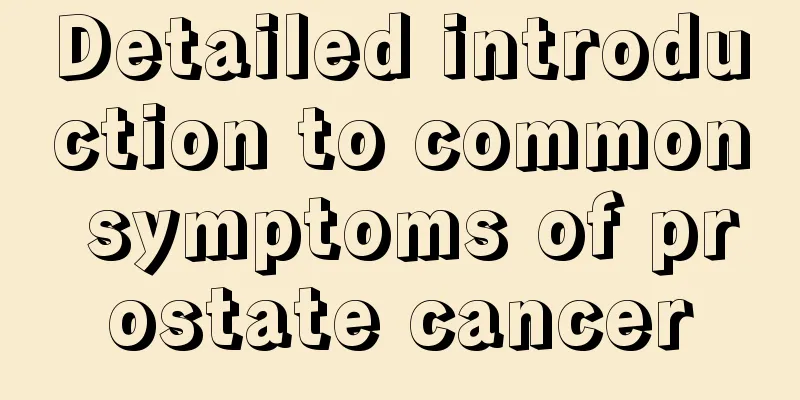What are the symptoms of colorectal cancer

|
The symptoms of colorectal cancer vary depending on the location. Common symptoms of right-sided colon cancer include weight loss, fatigue, and anemia, while left-sided colon cancer often presents with symptoms such as ileus. 1. Symptoms of right colon cancer Right-sided colon cancer is usually difficult to detect in the early stages due to the wider intestinal cavity. Common symptoms include weight loss, fatigue, and anemia. This may be because the tumor causes long-term chronic bleeding and the body cannot absorb enough nutrients. It is also possible to find a mass in the right lower abdomen. Although it is not easy to detect, if you feel an abnormal hard mass, it is recommended to seek medical attention in time. 2. Symptoms of left-sided colon cancer The intestinal cavity of left-sided colon cancer is narrower, which makes it easy to develop intestinal blockage. Common symptoms include abdominal pain, constipation or changes in bowel habits. There may be mucus, pus and blood in the stool, increased bowel movements, and a feeling of urgency, that is, the feeling that the bowel movements are not complete after going to the toilet. These symptoms often make people feel uncomfortable and affect their daily life. 3. Changes in bowel habits Whether it is right-sided or left-sided colorectal cancer, changes in bowel habits are an important sign. Pay attention to the shape, color, and frequency of your stools. If there are persistent changes, especially if your stools become thinner or contain blood, you should pay attention. 4. Abdominal discomfort and pain Abdominal discomfort is one of the common symptoms of colorectal cancer. You may feel bloating, cramps, or persistent abdominal pain. These symptoms may not be related to diet and may gradually worsen over time, so you need to be vigilant. 5. Systemic symptoms In addition to local symptoms, colorectal cancer may also cause systemic symptoms, such as fatigue, loss of appetite, and weight loss. These symptoms are often ignored because they are not specific enough, but if they occur at the same time as other symptoms, they need to be checked as soon as possible. 6. Early screening and prevention recommendations Early screening for colorectal cancer is very important, especially for people with a family history or those over 50 years old. Regular colonoscopy can help with early detection and treatment. Maintaining a healthy diet with more dietary fiber and less red and processed meat can also help reduce the risk. 7. Mental health concerns Mental health is equally important when facing colorectal cancer. Long-term symptoms may cause anxiety and depression. It is recommended to seek psychological support or join a relevant support group to get emotional help. By understanding these symptoms and suggestions, we can better pay attention to our own health. Once suspected symptoms appear, timely medical treatment is the key. Maintaining a healthy lifestyle and regular physical examinations are effective ways to prevent colorectal cancer. |
<<: Symptoms and measures for advanced pancreatic cancer
>>: What are the surgical methods for gastric cancer
Recommend
What foods can prevent liver cancer? Eating this regularly can prevent liver cancer
Bitter melon can prevent liver cancer The bitter ...
Patients with rectal cancer also have positive stool occult blood or bloody stools
Patients with rectal cancer also have positive st...
What are the common symptoms of skin cancer?
Nowadays, people's pace of life and work are ...
72Can gastric cancer and cerebral infarction be treated surgically?
Generally speaking, if the patient is in good phy...
Let’s take a look at the early symptoms of prostate cancer
Prostate cancer is a common cancer in men, and me...
Will osteosarcoma kill people?
Due to the lack of medical knowledge, many malign...
Can patients with advanced lung cancer still be treated?
Many people generally believe that if you have ca...
What kind of plants are suitable for the bedroom
Planting flowers and grass is very beneficial to ...
How does TCM diagnose pulse
There is a beating pulse in the wrist joints of a...
The formation and harmfulness of hypertension
Nowadays, more and more people are troubled by hy...
What medicine to take for gastric cancer
What medicine should I take for gastric cancer? 1...
How many times a day is normal to have bowel movements?
The human body is constantly metabolizing every d...
What is a vesicular rash? Causes of vesicular rash
Vesicular rash is a common skin disease. Infants ...
Reasons why pituitary tumors are easily misdiagnosed
Because the clinical symptoms of pituitary tumors...
Calories in grapefruit
Grapefruit also contains some calories, which mak...









